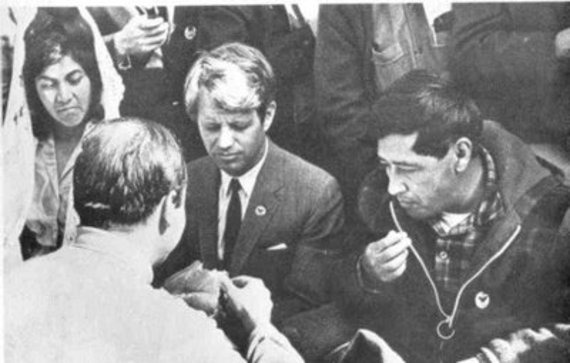"A change of attitude towards migrants and refugees is needed on the part of everyone, moving away from attitudes of defensiveness and fear, indifference and marginalization - all typical of a throwaway culture - towards attitudes based on a culture of encounter, the only culture capable of building a better, more just and fraternal world," Pope Francis
In an attempt to bridge the divide between whites and Latinos, Senator Robert F. Kennedy visited Cesar Chavez during a UFWOC farmworker's strike in 1968. There are few other times in the nation's history where such solidarity existed between two uniquely different individuals. Kennedy was from a wealthy Irish-American family and Chavez from a poor Mexican-American family.
Yet it's important to note both Kennedy and Chavez shared their Catholic faith throughout the struggle for social justice.
The meeting between RFK and Chavez can serve as a benchmark for Catholics who desire comprehensive immigration reform and the restoration of labor rights. Until both issues are properly addressed, the United States will continue to see needless ethnic animosity between the working class.
Time and again, first generation American Catholics have sought to contribute to the common good of the nation. Despite views to the contrary, the vast majority left their native country in an attempt to provide a happy, healthy future for their children. Many of the new arrivals experienced economic hardships and societal prejudices.
History has shown how cruel we can be to our fellow man; be they legal citizens or otherwise.
For example, Irish American Catholics had to endure poor living and working conditions, mob violence, and organized political resistance in the form of the 1850s nativist American Party, or as it was commonly known, "The Know Nothing Party". Not surprisingly, the Tea Party movement shares many of the same characteristics and stances of the Know Nothings. For example, both favor 'traditional American values' and have a fear of being overrun by newcomers. In both instances, they represent a small yet loud segment of the population.
However, such animosity and division wasn't always so pronounced.
While running for reelection in 1984, President Reagan favored stronger borders, sanctions on businesses who employed illegals, and amnesty. Reagan went on to sign a bill in 1986 that legalized the status of almost 3 million people; a bill which Chavez backed.
You'd be hard pressed to find a conservative who shares those views today.
In fact, one of the rising stars in conservative circles, Senator Rand Paul of Kentucky, is firmly opposed to amnesty and is against an E-Verify system that would prevent employers from hiring illegal immigrants. And despite the recent crisis at the border involving thousands of young children, illegal immigrants crossing the border is at its lowest point since 1973.
Senator Paul and others like him oppose these common sense measures because they don't value the dignity of labor.
As history has shown, it took a diverse coalition of immigrants, farmers, and blue collar workers at the dawn of the 20th century to fundamentally change working and living conditions not only for themselves but for future generations. Unfortunately, such a progressive coalition of workers doesn't exist anymore.
Today, the labor rights movement is once again beginning to realize what their progressive forefathers understood- strength in numbers. However, modern labor unions in general are a divided, fractured group that are hesitant to support a new progressive movement.
There are two main factors for this hesitancy. For decades, labor unions saw themselves as exclusive, elitist clubs in which only skilled craftsmen could join. Labor unions felt no real connection to low skill workers. As the 20th century progressed, the need for skilled craftsmen gradually diminished as increasingly automated factories required either more low skill workers or less workers in general. To highlight this dilemma, 1950s private sector union membership peaked at 35%. In 2012, private sector union membership was down to just 6.6%. Far more destructive was the ethnic discrimination that barred many from joining labor unions. In much of the south, white workers were discouraged from joining unions and were given anti-union leaflets that read, "Would you belong to a union which opposes white supremacy?" During the Homestead strike of 1892, strikebreakers hired non-union black workers; which resulted in a riot. Such tactics drove a wedge between workers who should have been united in common cause. Today, those that use fear and hate as weapons have continued such tactics: pitting white versus Latino, rich versus poor, and young versus old.
The Tea Party and those who finance its message of fear and hate blame illegal immigrants for stealing jobs and driving down wages. Like Senator Rand Paul, few in the Tea Party or conservative circles want to blame the employers who benefit from hiring illegal workers.
Bottom line, when worker rights are denied, it makes it easy for those in power to abuse the system at the expense of the average citizen and immigrant alike.
Workers are realizing this and have begun to organize in the retail and fast food industries. It's yet to be determined if these efforts will pay off. Owners of capital know the job market is weak and are effectively using that reality to drive a wedge between labor and immigrants.
As a student of history, I'm well aware history repeats itself. Or at the very least human nature repeats itself. I firmly believe there are moments in history so unique they only come about once. We may be experiencing such a moment in history with regards to immigration reform and the reemergence of a strong, vibrant labor movement. Catholics that desire common sense immigration reform should consider joining forces with a new generation of labor activists in facing what will surely be shared challenges.
When confronting these complex issues, let us remember the words of Saint John Neumann, the bishop of Philadelphia from 1852 to 1860, "Give me an increasing love for your people." Such love for all peoples will make these issues not seem insurmountable.

